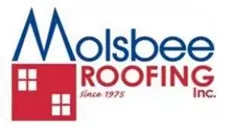Living in South Florida means enjoying beautiful beaches and warm weather year-round. However, the same coastal environment that makes this area so desirable also presents unique challenges for homeowners—especially when it comes to roofing. High humidity and salt air can cause significant wear and tear on roofs, shortening their lifespan and increasing maintenance needs.
At Molsbee Roofing, we understand the impact of South Florida’s climate on different roofing materials. In this guide, we’ll explore how humidity and salt air affect your roof and what you can do to keep it in top condition.
High humidity and salt air can cause significant wear and tear on roofs, shortening their lifespan and increasing maintenance needs.
1. The Impact of High Humidity on Your Roof
South Florida’s tropical climate brings year-round humidity, which can lead to serious roofing issues:
Mold, Mildew & Algae Growth
-
Excess moisture creates the perfect environment for mold, mildew, and algae to grow on shingles and tiles.
-
Black streaks or greenish patches on your roof are signs of algae, which can weaken roofing materials over time.
Wood Rot & Structural Damage
-
Wooden components like rafters and decking can absorb moisture, leading to rot and weakening of your roof’s structure.
-
Humidity can cause warping or swelling in certain roofing materials, reducing their effectiveness.
Shingle Deterioration
-
Asphalt shingles can absorb moisture, causing them to curl, crack, or lose their protective granules.
-
Over time, excessive moisture leads to premature aging and the need for roof replacement sooner than expected.


2. The Effects of Salt Air on Roofing Materials
Homes near the coast are constantly exposed to salt air, which can accelerate corrosion and deterioration of roofing materials.
Metal Roofing & Corrosion
-
While metal roofs are a popular choice for durability, they can be prone to rust if not properly coated with protective finishes.
-
Aluminum and galvanized steel are more resistant to salt air corrosion than standard steel.
Tile Roofs & Salt Buildup
-
Clay and concrete tiles are naturally resistant to salt air, making them a great option for coastal homes.
-
However, salt buildup can cause erosion over time, requiring regular cleaning and maintenance.
Fasteners & Flashing Issues
-
Even if your roofing material is salt-resistant, metal fasteners, nails, and flashing can corrode, leading to leaks and structural weaknesses.
-
Stainless steel or corrosion-resistant materials should be used in coastal roofing systems to prevent deterioration.
3. How to Protect & Maintain Your Roof in South Florida
To combat the effects of humidity and salt air, homeowners should follow these maintenance tips:
? Schedule Regular Roof Inspections
-
Have your roof inspected at least once a year to check for early signs of damage.
-
Inspections after storms or hurricane season can help catch issues before they worsen.
? Clean Your Roof to Prevent Mold & Algae
-
Use a gentle, low-pressure wash or an algae-resistant treatment to prevent buildup.
-
Avoid high-pressure washing, which can damage shingles or tiles.
? Choose the Right Roofing Materials
-
Metal roofing? Opt for aluminum or zinc coatings to prevent rust.
-
Shingles? Consider algae-resistant asphalt shingles.
-
Tiles? Clay or concrete tiles are naturally resistant to salt air.
? Apply Protective Coatings
-
Special roof coatings can shield against moisture, algae, and corrosion.
-
Protective sealants for metal roofs can significantly extend their lifespan.
? Trim Nearby Trees & Improve Ventilation
-
Keeping trees trimmed reduces moisture buildup and prevents debris from damaging your roof.
-
Ensure proper attic ventilation to reduce humidity and prevent mold growth.
Protect Your Roof with Molsbee Roofing
South Florida’s climate is tough on roofs, but with the right materials and maintenance, you can extend the life of your roof and avoid costly repairs. At Molsbee Roofing, we specialize in roofing solutions designed to withstand humidity, salt air, and coastal weather conditions.
? Call us today for a FREE roof inspection! Let’s make sure your roof is ready to handle South Florida’s unique challenges.
